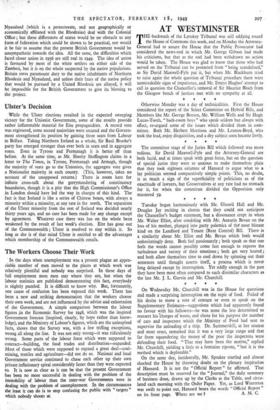The Workers Choose Their Work
In the days when unemployment was a present plague an appre- ciable number of men moved to the places at which work was relatively plentiful and nobody was surprised. In these days of full employment most men stay where they are, but when the labour statistics are published demonstrating this fact, everybody is slightly puzzled. It is difficult to know why. But, fortunately, one cause of confusion has been exposed this week. There has been a new and striking demonstration that the workers choose their own work, and are not influenced by the advice and exhortation of the Government. A simple comparison between the labour figures „in the Economic Survey for 1948, which was the inspired Government forecast (inspired, clearly, by hope rather than know- ledge), and the Ministry of Labour's figures, which are the uninspired facts, shows that the Survey was, with a few trifling exceptions, wrong all along the line. It was not only wrong—it was ridiculously wrong. Some parts of the labour force which were supposed to contract—building, the food trades and distribution—expanded. Most of those which were supposed to expand a great deal—coal- mining, textiles and agriculture—did not do so. National and local Government service continued to chase each other up their own private inflationary spiral considerably faster than they were expected to. It is now as clear as it can be that the present Government has been no more successful in dealing with the problem of the immobility of labour than the interwar Governments were in dealing with the problem of unemployment. In the circumstances the least it can do is to stop confusing the public with " targets " which nobody shoots at






































 Previous page
Previous page